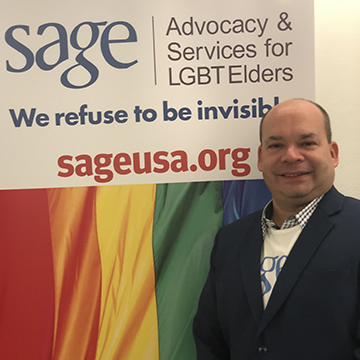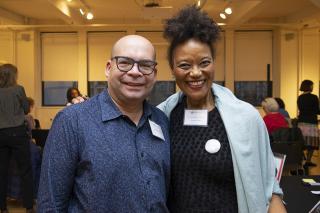After a career in mental health in Boston, Wilfred Labiosa ‘19PhD returned home to Puerto Rico to find an island in need — and a vision for how he could help.

When Wilfred Labiosa returned to Puerto Rico, where he was born and raised, in 2014, he didn’t know how challenging things would get in the U.S. Commonwealth. In recent years, the island has been damaged by hurricanes, a major earthquake, and a Federal government that has been at best indifferent, and at worst hostile to its plight. But through it all, Labiosa had a vision: “I moved home to Puerto Rico knowing that there was a need to support older adults who are LGBT,” he says.
That vision became Waves Ahead, an island-wide organization that is dedicated to working with marginalized and vulnerable sectors of Puerto Rican society by providing support in their needed areas in order to re-establish and strengthen them — most notably, with LGBT elders, who face an array of challenges from housing and food insecurity to discrimination and lack of access to mental health resources.
Labiosa had left Puerto Rico in 1988 to attend college in Boston, and after that he stayed, earning a master’s degree in psychology, and, last year, a doctorate in social work from Simmons University. Along the way, he worked in institutions and community organizations focused on mental health and Boston’s Latino community, including the Boston Public Health Commission and Children’s Hospital.
“Mental health issues are public health issues,” Labiosa says. “We have to take care of it from a preventative and proactive manner.”
If Waves Ahead represented the culmination of Labiosa’s career in mental health, Simmons’ Social Work doctoral program could be described as the bow that tied it all together. Labiosa says that a degree in social work was not necessarily part of the plan, but the program offered a new and dynamic way of thinking about his work.
“I knew [former social work professor] Michael Melendez,” Labiosa says, “and I had three friends who had graduated from the MSW program. They said you should think about it, that public health and social work would be a good fit. That piqued my interest... I started to see where I can complete my education with something that is more in tune with what I’m working on right now. That’s why I decided to enter with Michael’s support, I went a couple of times to meet professors — and the diversity of the staff, the acceptance of LGBT people, and general inclusiveness of the program really appealed to me.”
I’m always optimistic. I always have hope.
For his dissertation, Labiosa studied substance abuse in the LGBT community in Cuba, where he had spent years teaching courses and conducting humanitarian work.
“A lot of people told me, you cannot do that in Cuba,” Labiosa remembers. “I said, I understand Cuba and the US have had an interesting relationship, but let me see what I can do. Simmons faculty were very supportive — the faculty is really just incredible, people like Peter Maramaldi and Michelle Putnam, who was my advisor when I first started the program, just a good cadre of professors who developed a program that is very supportive of diversity. By the time I finished my research, I did 47 interviews with LGBT people, qualitative-based research, and I learned so much about community mobilizing, organizing, about real trauma — they’ve used their resiliency to come to where they’re at.”
Fast forward to 2017, when Labiosa formally established Waves Ahead as a 501(c)3 in Puerto Rico. At that moment, Labiosa knew that there was a pressing need to support LGBT elders on the island.
“The people we serve experience social isolation, anxiety, depression,” he says. “They grow up in a culture that is very homophobic and sexist. They have lived all these years in Puerto Rico, and they don’t know others like themselves. They live in this country for so many years, and as they get older, when they find themselves alone, they experience a lot of anxiety and depression. Since 2010, there has been an increase in death by suicide by older adults. The government doesn't collect the data for LGBT suicides, but we hear anecdotally. There was very little government support, so when we kicked off our first national campaign in PR, we had to partner with New York City’s Department of Aging — collaboration really is needed.”
Hurricane Maria in September of 2017 devastated Puerto Rico, with thousands of homes and other infrastructure damaged or destroyed, and nearly 3,000 Puerto Ricans killed. Labiosa quickly reoriented Waves Ahead to respond to the disaster, helping in the rebuilding efforts, providing mental health services and even necessities like food and clean water. Then, in January 2020, the island was hit by its strongest earthquake in decades.
“We did not anticipate the rebuilding effort,” says Labiosa, noting that Waves Ahead continues to make LGBT elders its focus but because of the overwhelming need, now serves Puerto Ricans of all walks of life. “Now with COVID, being under quarantine, it is more difficult, but we are still rebuilding homes that were forgotten.”
Through it all, Labiosa remains optimistic and committed to his work. “I’m always optimistic,” he says. “I always have hope. We need to do a little bit, but it keeps adding up to a lot — a lot of people doing a little, one day at a time one little great thing at a time, and we will be able to surpass this — but we need to keep hope alive.”

